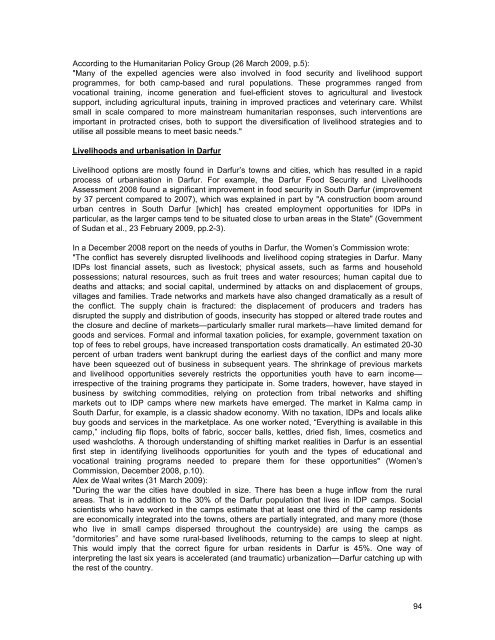SUDAN: Durable solutions elusive as southern IDPs return and ...
SUDAN: Durable solutions elusive as southern IDPs return and ...
SUDAN: Durable solutions elusive as southern IDPs return and ...
You also want an ePaper? Increase the reach of your titles
YUMPU automatically turns print PDFs into web optimized ePapers that Google loves.
According to the Humanitarian Policy Group (26 March 2009, p.5):<br />
"Many of the expelled agencies were also involved in food security <strong>and</strong> livelihood support<br />
programmes, for both camp-b<strong>as</strong>ed <strong>and</strong> rural populations. These programmes ranged from<br />
vocational training, income generation <strong>and</strong> fuel-efficient stoves to agricultural <strong>and</strong> livestock<br />
support, including agricultural inputs, training in improved practices <strong>and</strong> veterinary care. Whilst<br />
small in scale compared to more mainstream humanitarian responses, such interventions are<br />
important in protracted crises, both to support the diversification of livelihood strategies <strong>and</strong> to<br />
utilise all possible means to meet b<strong>as</strong>ic needs."<br />
Livelihoods <strong>and</strong> urbanisation in Darfur<br />
Livelihood options are mostly found in Darfur’s towns <strong>and</strong> cities, which h<strong>as</strong> resulted in a rapid<br />
process of urbanisation in Darfur. For example, the Darfur Food Security <strong>and</strong> Livelihoods<br />
Assessment 2008 found a significant improvement in food security in South Darfur (improvement<br />
by 37 percent compared to 2007), which w<strong>as</strong> explained in part by "A construction boom around<br />
urban centres in South Darfur [which] h<strong>as</strong> created employment opportunities for <strong>IDPs</strong> in<br />
particular, <strong>as</strong> the larger camps tend to be situated close to urban are<strong>as</strong> in the State" (Government<br />
of Sudan et al., 23 February 2009, pp.2-3).<br />
In a December 2008 report on the needs of youths in Darfur, the Women’s Commission wrote:<br />
"The conflict h<strong>as</strong> severely disrupted livelihoods <strong>and</strong> livelihood coping strategies in Darfur. Many<br />
<strong>IDPs</strong> lost financial <strong>as</strong>sets, such <strong>as</strong> livestock; physical <strong>as</strong>sets, such <strong>as</strong> farms <strong>and</strong> household<br />
possessions; natural resources, such <strong>as</strong> fruit trees <strong>and</strong> water resources; human capital due to<br />
deaths <strong>and</strong> attacks; <strong>and</strong> social capital, undermined by attacks on <strong>and</strong> displacement of groups,<br />
villages <strong>and</strong> families. Trade networks <strong>and</strong> markets have also changed dramatically <strong>as</strong> a result of<br />
the conflict. The supply chain is fractured: the displacement of producers <strong>and</strong> traders h<strong>as</strong><br />
disrupted the supply <strong>and</strong> distribution of goods, insecurity h<strong>as</strong> stopped or altered trade routes <strong>and</strong><br />
the closure <strong>and</strong> decline of markets—particularly smaller rural markets—have limited dem<strong>and</strong> for<br />
goods <strong>and</strong> services. Formal <strong>and</strong> informal taxation policies, for example, government taxation on<br />
top of fees to rebel groups, have incre<strong>as</strong>ed transportation costs dramatically. An estimated 20-30<br />
percent of urban traders went bankrupt during the earliest days of the conflict <strong>and</strong> many more<br />
have been squeezed out of business in subsequent years. The shrinkage of previous markets<br />
<strong>and</strong> livelihood opportunities severely restricts the opportunities youth have to earn income—<br />
irrespective of the training programs they participate in. Some traders, however, have stayed in<br />
business by switching commodities, relying on protection from tribal networks <strong>and</strong> shifting<br />
markets out to IDP camps where new markets have emerged. The market in Kalma camp in<br />
South Darfur, for example, is a cl<strong>as</strong>sic shadow economy. With no taxation, <strong>IDPs</strong> <strong>and</strong> locals alike<br />
buy goods <strong>and</strong> services in the marketplace. As one worker noted, “Everything is available in this<br />
camp,” including flip flops, bolts of fabric, soccer balls, kettles, dried fish, limes, cosmetics <strong>and</strong><br />
used w<strong>as</strong>hcloths. A thorough underst<strong>and</strong>ing of shifting market realities in Darfur is an essential<br />
first step in identifying livelihoods opportunities for youth <strong>and</strong> the types of educational <strong>and</strong><br />
vocational training programs needed to prepare them for these opportunities" (Women’s<br />
Commission, December 2008, p.10).<br />
Alex de Waal writes (31 March 2009):<br />
"During the war the cities have doubled in size. There h<strong>as</strong> been a huge inflow from the rural<br />
are<strong>as</strong>. That is in addition to the 30% of the Darfur population that lives in IDP camps. Social<br />
scientists who have worked in the camps estimate that at le<strong>as</strong>t one third of the camp residents<br />
are economically integrated into the towns, others are partially integrated, <strong>and</strong> many more (those<br />
who live in small camps dispersed throughout the countryside) are using the camps <strong>as</strong><br />
“dormitories” <strong>and</strong> have some rural-b<strong>as</strong>ed livelihoods, <strong>return</strong>ing to the camps to sleep at night.<br />
This would imply that the correct figure for urban residents in Darfur is 45%. One way of<br />
interpreting the l<strong>as</strong>t six years is accelerated (<strong>and</strong> traumatic) urbanization—Darfur catching up with<br />
the rest of the country.<br />
94
















